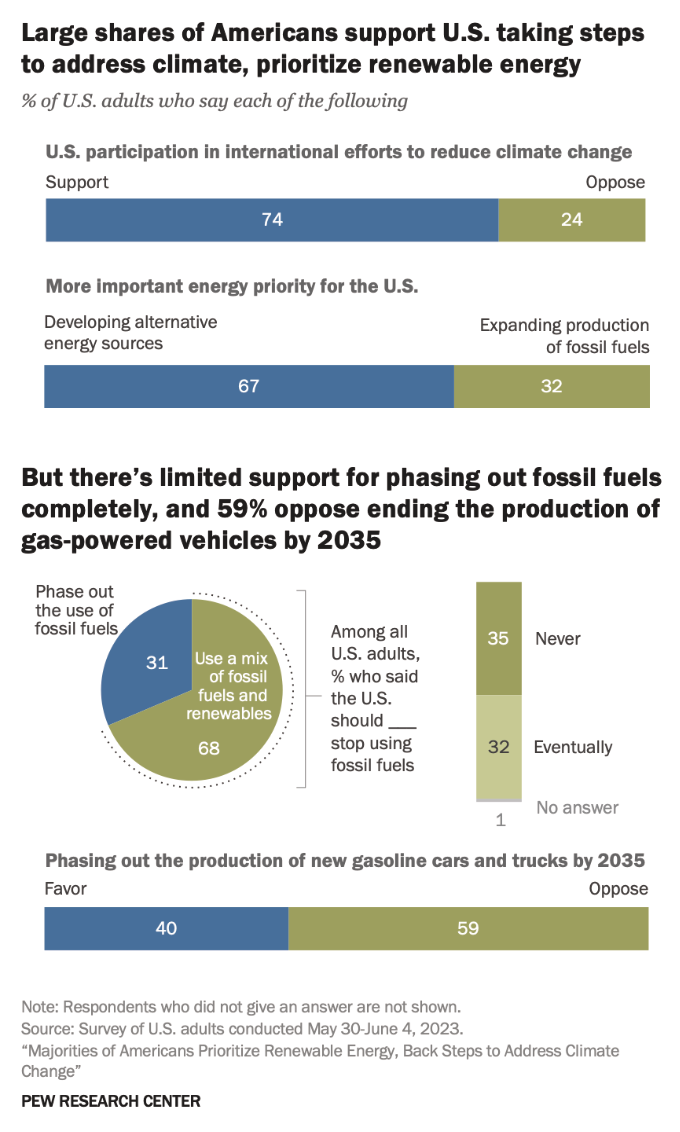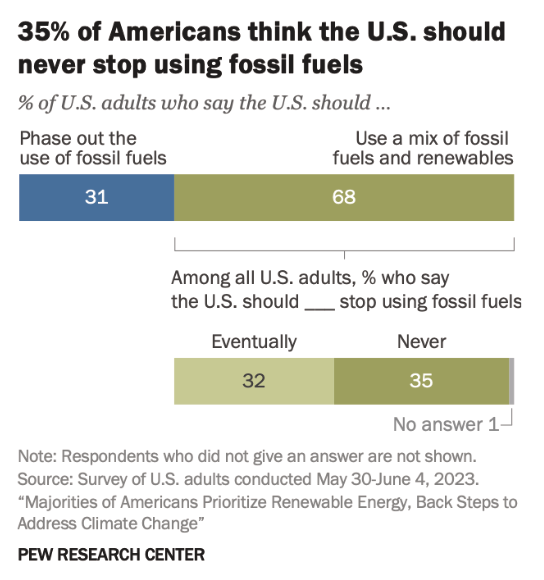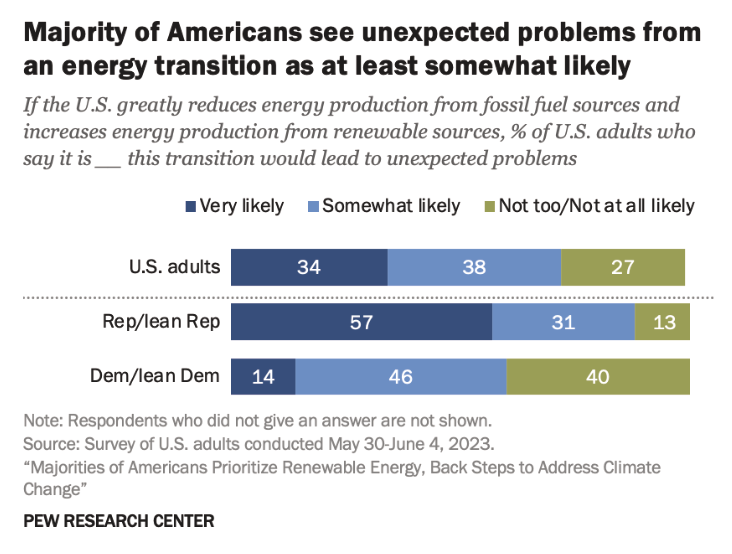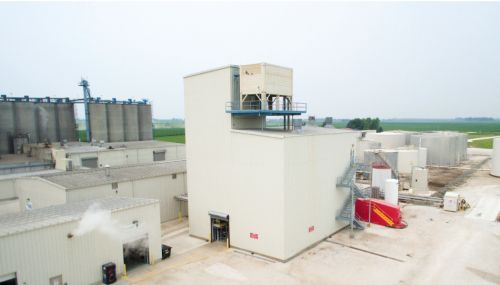All
Americans Want Traditional Fuels AND Clean Energy
by James Cunningham

Pew Research reveals the country isn’t ready to give up fossil fuels.
In 2023, ‘renewable’ is the name of the game. It seems like every week a new industry is touting its advances in the research and development of the next renewable energy resource that will act as the savior to our mortal nemesis - climate change. Our lead article shines a light on two of those new emerging energy sources, hydrogen and geothermal, and what you may not be hearing behind all the cheering around their “breakthroughs.” Issues like horizontal drilling and ground and water pollution lurk just beyond the wide-eyed industries that have accrued billions of dollars in federal grants. And yet all we seem to read about is the tremendous advancements these renewable energy sources have made.
But what does the American public think?
Pew Research Study Released
In a recent study done by Pew Research, 10,329 U.S. adults were surveyed between May 30 to June 4 about renewable energy practices and our current climate plans. The majority of Americans favor taking steps toward renewable energy: 74 percent support America’s participation in international efforts to reduce the effects of climate change. At the same time, it is evident that most want to do so in the most logical manner possible: 68 percent approve of including a mix of fossil fuels and renewable energy to reduce carbon emissions.
The results based on political party were more nuanced than one might expect.
For Republicans, 73 percent would be upset if gas-powered vehicles were phased out, and 58 percent said that expanding our oil, coal, and natural gas production should be the focus of our country’s energy plans. But, 67 percent of Republicans agreed to a business tax credit for developing carbon capture technologies, 70 percent agree that more solar panel farms are necessary, and 60 percent favor more wind farms.
As for Democrats, 94 percent support U.S. participation in international efforts to reduce the effects of climate change, and 90 percent say renewable energy sources should take priority over the continued production of fossil fuels. But still, 51 percent of Democrats oppose phasing out fossil fuels altogether.
A Closer Look at the Transition to Renewables
There is no question that the transition to renewable energy sources like wind, solar, geothermal, and hydrogen is well underway. The government has allocated billions of dollars in federal grants to these industries in order to speed up the renewable energy transition. The question becomes, where does this leave the fossil fuel industry, and how can it aid in the fight against global warming?
It’s a complicated question and one that warrants further discussion.
For instance, the 68 percent of Americans who approve of the mix of fossil fuels and renewables were nearly split down the middle with regard to ending fossil fuel use completely: 32 percent want to eventually phase out fossil fuels, while 35 percent never want to end their use. Again, this issue is a sophisticated one that demands more of a conversation than simply electrifying everything and villainizing anyone who doesn’t get in line.
Another fascinating result in the Pew Research study is the breakdown of public thought about unexpected problems concerning an energy transition away from fossil fuels. Their answers were almost evenly split between the belief that transitioning away from fossil fuels would “very likely,” “somewhat likely,” and “not too/not at all likely” lead to unexpected problems. These results were also explored based on
political leanings.
From the data, you can see there is a significant difference between how Republicans and Democrats view the problems associated with transitioning to renewables: 57 percent of Republicans answered that we are very likely to see issues when transitioning away from fossil fuels, while only 14 percent of Democrats answered the same. On the flip side of this question, 40 percent of Democrats think that it is not at all likely that problems will arise from an energy transition, and only 13 percent of Republicans agreed. Even though 46 percent of Democrats think it is somewhat likely issues will occur, where the two parties differ vastly is in the extreme ends of the question.

What Does the Data Tell Us?
While the transition into a net-zero future is supported by the general public, many are hesitant to do so without the aid of our robust fossil fuel industry. For their part, the liquid fuel industry has tried to incorporate its own renewable choices, such as biodiesel and Bioheat® fuel, into the conversation. States across the Northeast, like New York, Rhode Island, and Connecticut, have already implemented mandates for fuel providers to only deliver Bioheat® fuel to their customers with requirements to increase the Bioheat® fuel blends delivered in the future. Rhode Island just increased their requirements to B10 statewide – 10 percent biodiesel fuel – beginning July 1, 2023.


Look no further than the Inflation Reduction Act (IRA), which was signed exactly one year ago. The IRA provides hundreds of dollars in tax incentives for homeowners who upgrade to new energy-efficient oil-fired boilers and furnaces that meet the ENERGY STAR® requirements. This is a clear indication from the Biden administration that our transition into a renewable energy future should be aided by the fossil fuel industry.
It seems that, for the most part, we can all agree that we need to reduce the amount of carbon dioxide in our air, but committing too fast and too soon to unproven renewable energy sources that lack proper infrastructure and testing has the potential to do more harm than good.
Related Posts
 Why Quality Matters in Your Biofuel Blends
Why Quality Matters in Your Biofuel Blends
Posted on June 25, 2025
 Incorporating Higher Blends of Biofuels
Incorporating Higher Blends of Biofuels
Posted on May 14, 2025
 NORA Programs at Eastern Energy Expo
NORA Programs at Eastern Energy Expo
Posted on May 13, 2025
 March Short-Term Energy Outlook
March Short-Term Energy Outlook
Posted on April 28, 2025
Enter your email to receive important news and article updates.
